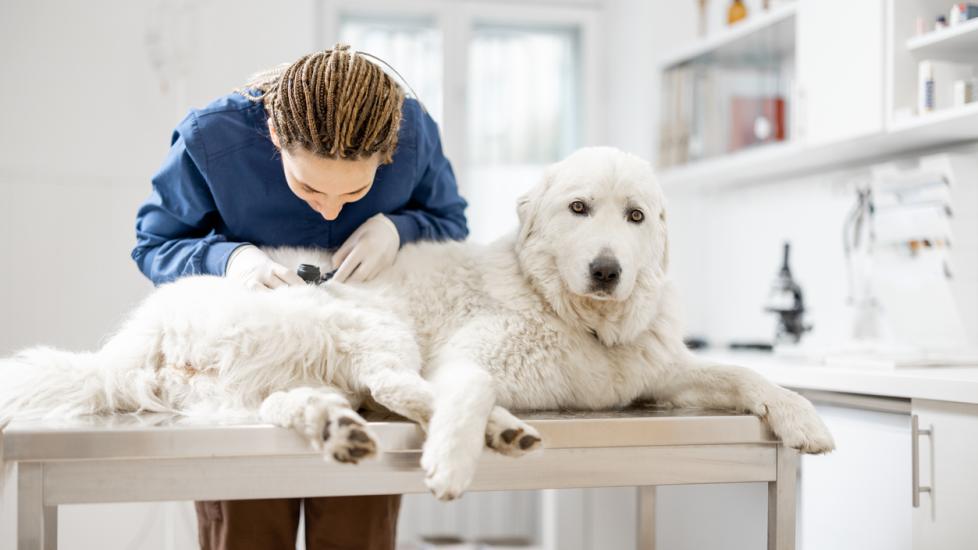In the world of canine health, squamous cell carcinoma (SCC) is a formidable adversary that pet owners and veterinarians alike must face with diligence. This insidious form of cancer arises from the squamous cells—flat, scale-like cells that are found within the skin’s topmost layer and around the body’s internal organs. SCC in dogs often manifests as an aggressive tumor, displaying its ugly head most frequently on the nose, lips, eyelids, ears, or genitalia due to these areas being exposed to sunlight and other environmental factors. The condition may also strike less commonly at pressure points such as footpads, where repetitive friction leads to chronic inflammation and increased susceptibility to malignancy.
The onset of SCC is typically slow but relentless; it begins with subtle changes like scaling or crusting before progressing to thickened plaques and ultimately forming into firm nodules that invade deeper tissues. As the disease advances, it can metastasize to lymph nodes and distant organs, posing a significant threat to your furry companion’s well-being. Early detection through regular veterinary checkups and diligent monitoring for any abnormalities is key in combating this deadly foe.
Veterinary oncologists have noted several risk factors associated with the development of SCC in dogs:
-
Genetics: Certain breeds seem predisposed to developing SCC, including Boxers, Bulldogs, German Shepherds, Golden Retrievers, and Rottweilers. These genetic tendencies should be taken seriously by dog enthusiasts who prioritize their pets’ longevity and quality of life.
-
Age: Older dogs are more likely to develop SCC than younger ones. With each passing year, the chances increase, making senior care all the more crucial.
-
Exposure: Prolonged exposure to ultraviolet radiation from the sun or tanning beds can lead to DNA damage within squamous cells, which if left unchecked, may culminate in cancerous growths. Similarly, chemicals used in wood preservatives, pesticides, and certain industrial processes can contribute to the development of SCC when inhaled or absorbed through the skin.
-
Immune System: A compromised immune system, whether due to underlying diseases or immunosuppressive treatments, can make dogs more susceptible to various cancers, including SCC.
-
Chronic Inflammation: Conditions that cause long-term irritation or inflammation, such as repeated infections or allergies, may create an environment conducive to cellular transformation and subsequent neoplastic development.
When confronted with SCC, prompt action is paramount. Your vet will perform a thorough examination followed by diagnostic tests like fine needle aspiration or biopsy to confirm the presence of cancerous cells. Based on the extent of the disease and individual patient factors, treatment options might include surgery, radiation therapy, chemotherapy, or a combination thereof. It’s important to note that early surgical removal offers the best prognosis, particularly for localized tumors without evidence of spread. However, even after successful intervention, close follow-up appointments are necessary to monitor for recurrence.
Prevention plays just as vital a role as treatment does in managing SCC. Here are some steps you can take to safeguard your pooch against this devastating malady:
-
Sun Protection: Apply pet-safe sunscreen liberally on areas prone to sun exposure during peak hours. Use UV-protective clothing or parasols when appropriate.
-
Regular Check-Ups: Schedule routine physical exams with your vet to identify potential problems at an early stage.
-
Environmental Awareness: Limit contact with known carcinogens and educate yourself about emerging threats in your area.
-
Maintain Good Health: Keep your dog healthy through proper nutrition, exercise, and vaccination protocols, ensuring a robust immune response.
-
Early Detection: Familiarize yourself with the signs of SCC so you can report any suspicious lesions promptly to your veterinarian.
By adopting a proactive approach and working closely with your trusted veterinary team, you can help ensure that your beloved four-legged friend lives a happy, healthy life free from the scourge of squamous cell carcinoma. Remember, knowledge truly is power when it comes to safeguarding our cherished companions!
